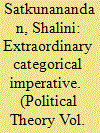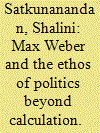| Srl | Item |
| 1 |
ID:
103755


|
|
|
|
|
| Publication |
2011.
|
| Summary/Abstract |
Many political theorists assume that Kant's categorical imperative can only present itself to politics epistemologically-that is, as a test or procedure for acquiring more certain knowledge of duties. This study retrieves the ontological aspect of the categorical imperative by showing that the Groundwork of the Metaphysic of Morals is a conversion narrative. In the Groundwork Kant describes a transformative encounter with the categorical imperative as a principle that discloses our (ordinarily concealed) ontological condition. This encounter opens a new mode of being characterized by the feeling of awe. In its ontological aspect, the categorical imperative discloses human freedom and demands an unflagging thoughtfulness, but offers no material guidance about duties. When understood in both its ontological and epistemological aspects, the categorical imperative offers a rich portrait of human responsibility and can help illuminate the ethical stance appropriate to politics without becoming a standard to be imposed upon politics.
|
|
|
|
|
|
|
|
|
|
|
|
|
|
|
|
| 2 |
ID:
131506


|
|
|
|
|
| Publication |
2014.
|
| Summary/Abstract |
According to the prevailing interpretation of "Politics as a Vocation," the Weberian political leader is willing to leave morality behind and make hard-headed consequentialist calculations about political means. I argue that the Weberian political leader is more accurately described as someone who keeps calculation in its place-both in terms of assessing the consequences of pursuing certain means and, more fundamentally, in terms of a basic framework for viewing responsibility and the world. Indeed, inappropriate substitutions of "calculative" thinking for a broader, more responsive thoughtfulness about the world mark Weber's three paradigms of irresponsible political leadership: the morally absolutist politician, the bureaucratic politician, and the power politician. Further, foregrounding Weber's effort to corral calculation reveals that uncompromising ethical stands in politics need not amount to naïveté or reckless disregard for the consequences, and that morality has a continuing claim on his ideal leader.
|
|
|
|
|
|
|
|
|
|
|
|
|
|
|
|